12天班课计划中考英语
初三英文学习计划表

针对初三学生的英语学习计划表可以如下安排,旨在全面提升英语能力和应对中考要求:第一阶段:巩固基础(9月初至10月中旬)目标:●巩固七年级与八年级的核心词汇和基本语法规则。
●提升听力理解与口语表达能力。
计划内容:1.每日任务:●背诵20个新单词,复习前一天的词汇。
●完成一篇短文的听力练习,记录并学习生词及短语。
●阅读一篇英文文章,总结大意并摘录好词好句。
2.每周任务:●完成一套基础语法习题,包括选择题、填空题等。
●参加一次小组讨论或角色扮演活动,提升口语交流能力。
●写一篇小短文,应用本周学习的新词汇和语法点。
3.每月任务:●总结本月学习的所有语法点,制作个人错题集。
●进行一次模拟测试,涵盖听力、阅读、写作等部分。
第二阶段:强化训练(10月中旬至12月底)目标:●加强阅读理解和完形填空技巧。
●提高写作水平,特别是应用文和议论文写作。
●深化语法运用,掌握复杂结构。
计划内容:1.每日任务:●增加到每日30个单词的学习量。
●练习一篇完形填空和两篇阅读理解。
●写一篇日记或小作文,注重使用复合句和连接词。
2.每周任务:●分析一篇优秀范文,学习其结构和用词。
●完成至少一次模拟听力测试,注意细节捕捉。
●参与至少一次英语角或外教互动,提升实际交流能力。
3.每月任务:●阅读一本英文简易读物或完成一系列学术文章阅读。
●写一篇较长的议论文,进行同伴互评和教师反馈。
●进行一次全面的自我评估,查漏补缺。
第三阶段:冲刺备考(1月至中考前)目标:●全面模拟中考,适应考试节奏。
●查缺补漏,针对弱点强化训练。
●心理调适,保持良好的考试状态。
计划内容:1.每日任务:●复习单词本和错题集,确保无遗漏。
●完成一套完整的模拟试题,包含所有考试部分。
●调整作息,保证充足睡眠。
2.每周任务:●分析上周模拟考试结果,针对性强化训练。
●参加至少一次考前辅导或讲座,获取最新考试动态和策略。
●保持适量的英语阅读,以保持语言感觉和扩大知识面。
1.每月任务:●进行至少两次全真模拟考试,模拟真实考试环境。
九年级英语学科计划表

九年级英语学科计划表一、学习目标。
1. 掌握课本中的重点单词、短语、语法知识,提高词汇量至1800 - 2000个。
2. 能够熟练运用英语进行书面表达,写出结构清晰、语言流畅的作文,在中考作文中达到13 - 15分(满分15分)的水平。
3. 提升听力理解能力,在听力测试中得分率达到85%以上。
4. 提高阅读理解能力,能够快速准确地理解文章大意,并掌握文章中的细节信息。
二、学习资料。
1. 人教版九年级英语课本。
3. 英语周报(九年级版)4. 在线英语学习平台(如百词斩用于词汇学习、可可英语用于听力和阅读练习)三、学习进度安排。
(一)第一阶段(第1 - 6周:基础知识巩固)1. 每周一至周五。
- 早上:背诵课本单词和短语30分钟。
- 上课期间:认真听讲,做好笔记,重点关注语法讲解部分。
- 晚上:- 复习当天所学单词、短语和语法知识,做课本后的练习题30 - 45分钟。
- 阅读英语短文一篇(可从英语周报或在线平台选取),并进行简单的概括,用时20 - 30分钟。
2. 周末。
- 周六。
- 复习本周所学单词、短语和语法,整理错题1 - 2小时。
- 进行单元词汇和语法小测试(可自己出题或者使用学习资料中的测试题),1小时。
- 周日。
- 观看一部英语电影或者动画,并尝试不看字幕理解大致内容,2 - 3小时。
- 背诵一篇英语作文范文,30 - 45分钟。
(二)第二阶段(第7 - 12周:能力提升)1. 每周一至周五。
- 早上:复习之前背诵的单词,同时背诵新的拓展词汇20分钟。
- 上课期间:积极参与课堂互动,针对阅读理解、书面表达等题型的解题技巧进行学习。
- 晚上:- 听英语听力材料(可可英语上的中考听力真题)20 - 30分钟,并进行听力原文分析。
2. 周末。
- 周六。
- 进行一套完整的中考模拟试卷测试(不含作文),按照考试时间要求完成,2 - 2.5小时。
- 分析试卷错题,查漏补缺,1.5 - 2小时。
- 周日。
12天突破英语语法
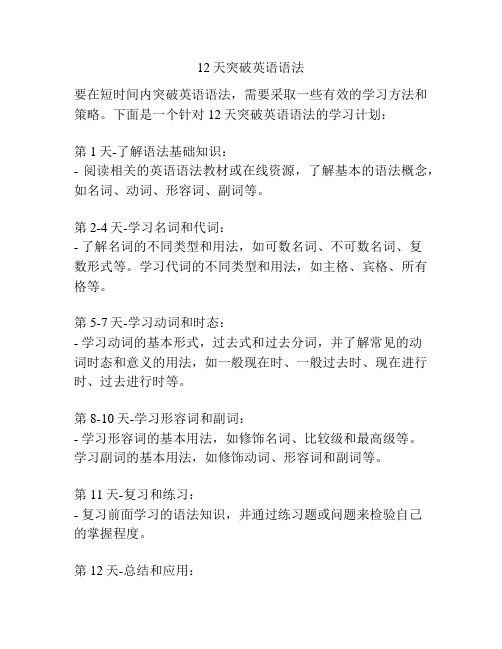
12天突破英语语法要在短时间内突破英语语法,需要采取一些有效的学习方法和策略。
下面是一个针对12天突破英语语法的学习计划:第1天-了解语法基础知识:- 阅读相关的英语语法教材或在线资源,了解基本的语法概念,如名词、动词、形容词、副词等。
第2-4天-学习名词和代词:- 了解名词的不同类型和用法,如可数名词、不可数名词、复数形式等。
学习代词的不同类型和用法,如主格、宾格、所有格等。
第5-7天-学习动词和时态:- 学习动词的基本形式,过去式和过去分词,并了解常见的动词时态和意义的用法,如一般现在时、一般过去时、现在进行时、过去进行时等。
第8-10天-学习形容词和副词:- 学习形容词的基本用法,如修饰名词、比较级和最高级等。
学习副词的基本用法,如修饰动词、形容词和副词等。
第11天-复习和练习:- 复习前面学习的语法知识,并通过练习题或问题来检验自己的掌握程度。
第12天-总结和应用:- 总结所学的语法知识,并试着应用它们到实际的英语句子中。
阅读英文文章或写一些简单的句子来巩固所学的语法知识。
此外,还有一些其他的学习技巧可以帮助你更好地理解和掌握英语语法:- 将语法知识与实际应用相结合,通过阅读、听力和口语练习来加深理解和记忆。
- 主动参与到语言环境中,用英语进行交流和讨论,并尝试使用新学的语法知识。
- 制定学习计划并保持持续的学习进度,每天花一些时间恶补自己的语法知识。
通过以上的学习计划和学习技巧,你可以在12天内快速突破英语语法。
记住,语法是建立在不断学习和练习的基础上的,要不断进行复习和巩固才能持久地掌握。
2024年初三英语复习计划标准模板(2篇)
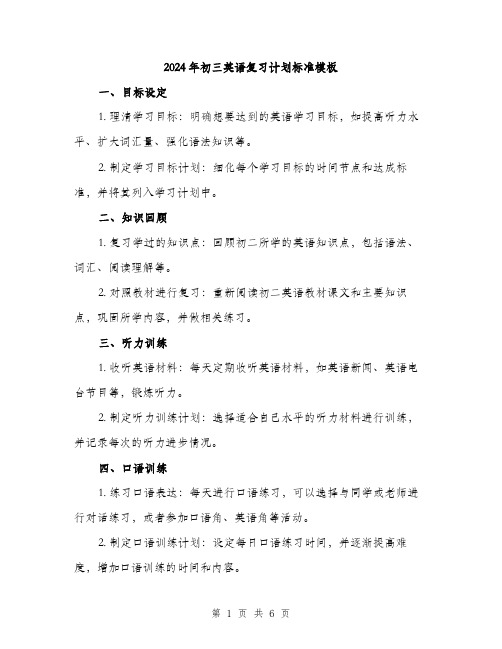
2024年初三英语复习计划标准模板一、目标设定1. 理清学习目标:明确想要达到的英语学习目标,如提高听力水平、扩大词汇量、强化语法知识等。
2. 制定学习目标计划:细化每个学习目标的时间节点和达成标准,并将其列入学习计划中。
二、知识回顾1. 复习学过的知识点:回顾初二所学的英语知识点,包括语法、词汇、阅读理解等。
2. 对照教材进行复习:重新阅读初二英语教材课文和主要知识点,巩固所学内容,并做相关练习。
三、听力训练1. 收听英语材料:每天定期收听英语材料,如英语新闻、英语电台节目等,锻炼听力。
2. 制定听力训练计划:选择适合自己水平的听力材料进行训练,并记录每次的听力进步情况。
四、口语训练1. 练习口语表达:每天进行口语练习,可以选择与同学或老师进行对话练习,或者参加口语角、英语角等活动。
2. 制定口语训练计划:设定每日口语练习时间,并逐渐提高难度,增加口语训练的时间和内容。
五、阅读训练1. 阅读英语材料:每天进行英语阅读训练,包括英语文章、新闻报道、小说等,培养阅读理解能力。
2. 制定阅读计划:选择适合自己水平的阅读材料,并记录每次的阅读时间和理解情况。
六、写作训练1. 练习写作技巧:每周进行写作练习,包括句子填空、短文写作等,提高写作能力。
2. 制定写作训练计划:设定每周写作练习的时间和题目,并逐渐提高难度和长度。
七、语法复习1. 复习语法知识点:逐个复习初二所学的语法知识点,并做相关练习题来巩固记忆。
2. 制定语法复习计划:制定每周的语法复习计划,包括复习内容和练习题,并检查自己的掌握情况。
八、词汇扩充1. 学习新词汇:每天学习一定量的新词汇,包括常用词汇、短语、固定搭配等,提高词汇量。
2. 制定词汇学习计划:设定每日词汇学习的时间和数量,并通过记忆卡片、词汇本等工具进行复习和巩固。
九、备考技巧1. 学习备考技巧:了解英语考试的题型和难点,学习备考的技巧和方法,提高考试成绩。
2. 制定备考计划:制定每周的备考计划,包括模拟试题的练习和错题的复习,并随时调整计划。
中考英语备考工作计划(6篇)
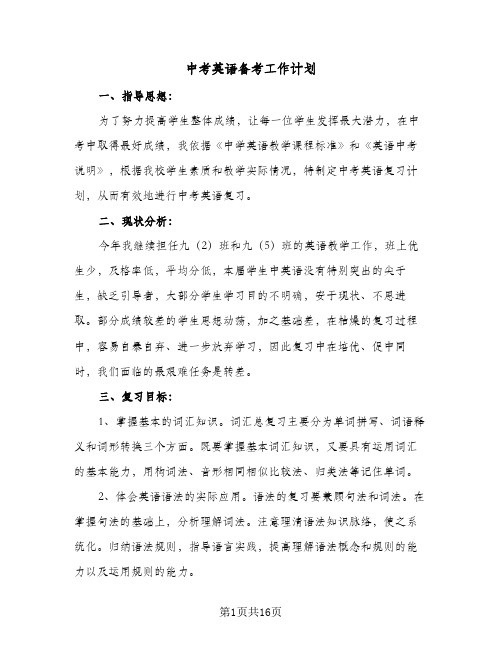
中考英语备考工作计划一、指导思想:为了努力提高学生整体成绩,让每一位学生发挥最大潜力,在中考中取得最好成绩,我依据《中学英语教学课程标准》和《英语中考说明》,根据我校学生素质和教学实际情况,特制定中考英语复习计划,从而有效地进行中考英语复习。
二、现状分析:今年我继续担任九(2)班和九(5)班的英语教学工作,班上优生少,及格率低,平均分低,本届学生中英语没有特别突出的尖子生,缺乏引导者,大部分学生学习目的不明确,安于现状、不思进取。
部分成绩较差的学生思想动荡,加之基础差,在枯燥的复习过程中,容易自暴自弃、进一步放弃学习,因此复习中在培优、促中同时,我们面临的最艰难任务是转差。
三、复习目标:1、掌握基本的词汇知识。
词汇总复习主要分为单词拼写、词语释义和词形转换三个方面。
既要掌握基本词汇知识,又要具有运用词汇的基本能力,用构词法、音形相同相似比较法、归类法等记住单词。
2、体会英语语法的实际应用。
语法的复习要兼顾句法和词法。
在掌握句法的基础上,分析理解词法。
注意理清语法知识脉络,使之系统化。
归纳语法规则,指导语言实践,提高理解语法概念和规则的能力以及运用规则的能力。
3、正确使用交际用语。
在复习中,要能运用初中阶段每个话题下的基本交际用语进行简单的交际。
4、注重阅读能力的培养。
有意识地进行阅读技巧训练,如精读、略读、选读、速读、带着问题读,利用关键词、关键句去领悟隐含的意思等。
5、抓好听力训练。
安排一定的时间进行强化性听力训练,熟悉测试题型。
结合听课文原声带、听力训练题以提高学生的听力水平。
6、强化书面表达能力的培养。
通过背诵典型的范文,大量的习作练习和指导,不断提高学生组织文章的能力,运用已学词汇进行描写的能力。
四、复习流程与时间安排:首先,我要提醒自己:无论在以下哪个复习阶段,在教学方法的选用上,坚持打破传统的复习模式,不搞填鸭式、满堂灌,而要利用提问式、讨论式、小组合作、自主学习等方法让学生归纳、总结,群策群力,互相补充或由师生共同归纳出各个阶段的知识要点、难点及考点。
中考考前30天英语学习计划范本

中考考前30天英语学习计划范本中考考前30天英语学习计划范本讲究科学的复习方法,做好考前一个月的复习计划,是发挥考试水平提高考试成绩的有效方法,下面店铺给大家介绍一下初三中考考前30天英语学习计划:初三中考考前30天大冲刺英语学习要点要把1-3年级的英语单词复习一遍,把各单元的短语,语法总结归纳一下,重点课文要熟读,要背的背一背;找本语法书把初中学过语法过一遍,练听力,做习题。
中考考前30天英语复习时间安排和复习方法:初三中考考前第一招:知识整合(时间:1+14 ,1天整理14天仿真练兵)1.红笔贴纸法。
把做错的题用红笔画下来,并改正,写不下的要粘小条。
每份都要自己批改出来,以备考前浏览用。
2.巧用小本本。
在做题中总结解题的方法,和一些常用,但课本中没有,还必须要会的知识。
这部分的知识要用小本笔记记下来做考前浏览用。
3.建立错题集。
不要重新抄录题目再重做。
要把你做的中考习题集留好,能订的订在一起,最好能用一个分页夹来装材料。
初三中考考前第二招:仿真强化(时间:15天)1.限时完成。
各学科要按中考的时间来做中考模拟题,不要看答案,限时完成并计时,做完批改,找出不足。
有错误的卷子要留好订好。
备用不能扔。
把每次统一模拟考试的卷要留好订在一起。
2.使用技巧。
要在解题的时候掌握技巧,能用口算的`要用口算,能用巧算的用巧算,能用公式的用公式,总之要在做题的时候学习如何使用技巧。
3.养成习惯。
要在做题的时候养成边做边检查的习惯,如果这时候还有写错字,做错题,抄错题等不良习惯,这可就是你中考的杀手了。
初三中考考前第三招:压轴总结(时间:5天)1.找各学校的压轴题来做,历年也可以,这是中考的方向。
2.找以往没出过的题进行复习,熟题也有可能变着样子出。
3.找同学或父母的朋友的子女互换压轴习题,加大见识。
考前第四招考前:浏览(考前一个星期)1.把以前所有学过的知识点(册)和总结拿出看,这个时候会的就会了,不会的就还是不会了,只能如此了。
2024中考英语复习备考计划(4篇)

2024中考英语复习备考计划一、总体复习思路1、按单元复习。
通览初中教材,进行单元知识点扫描。
目的是对基础知识和基本技能进行系统的复习,把好“基础关”;任务是掌握各单元知识结构,全面地复习知识点,完成理解记忆;重点是重视课标要求与教材的基础作用,强化基础知识和基本技能的训练;面向全体,面向基础。
2、语法专项复习。
钻研考试标准和考试说明,进行语法、词法、句子、时态和话题专项复习。
统揽初中教材中的重点语法项目,使学生从整体上把握初中教材内容。
3、题型专练,模拟演练。
按照中考题型进行题型专练,了解学生对基础知识和基本技能的掌握情况,抓住中考题型变化,确定训练方式,进行查缺补漏。
二、实施步骤及时间安排第一轮:时间安排:____月____日-____月____日主要内容:初中教材课文中出现的单词、短语、常用句型;掌握4a、4b中罗列的重点句子,理解所学语法内容。
从初一开始,初一上下册花三个星期时间复习,从初二内容起每天复习一个topic。
同时在课上老师语法总结复习一下,再由老师针对学生的一些薄弱知识分单元编写一些练习讲义给学生加以练习,每个topic出一份小测,主要题型为:单词、词组翻译及句子的挖空填空等,以考察学生对基础知识的掌握情况。
针对____月底的口语考试,在这段时间内,我们还要穿插进行口语的复习辅导,利用下午第四节的时间让学生进行口语操练。
故大概在____月初可以完成第一轮复习第二轮:时间安排:____月____日-____月____日主要内容:结合中考新探索系统复习语法。
包括名词、代词、数词、介词和介词短语、连词、形容词、副词、冠词、动词、句子。
掌握动词六种时态的构成及基本用法和被动语态,即现在进行时、一般现在时、一般过去时、一般将来时、现在完成时、过去进行时。
句法包括掌握陈述句、疑问句、祈使句和感叹句的构成和基本用法,掌握简单句的五种基本句型、并列句、宾语从句、定语从句和状语从句。
第三轮:时间安排:____月____日-中考前(略)在前两轮复习的基础上,进行语法专项练习并针对中考题型进行专项强化训练,提高对各种题型的解题能力。
2024年中考英语备考复习计划模板(4篇)

2024年中考英语备考复习计划模板一、第一轮复习计划初步复习考生主要是打牢基底,把基础巩固好。
那初步的复习任务就是背诵单词,考生可以先不用管那些买的单词书,直接记课本上的单词即可。
此外考生还要以课本为中心,多看重点词汇、短语以及语法。
考生可以按照教材的顺序,进行复习。
去记每个单元的词汇以及词汇的运用,当然要树立好目标,词汇大概要记一千六百多个才行。
二、第二轮复习计划经过了第一轮的复习,相信考生们也能很快适应第二轮复习了。
那第二轮复习考生要注意的事情就更多了,考生要进行全面的复习,包括单词、词性、时态、语法、写作等各个方面。
而且考生不仅是要掌握知识点,更要落实到做题上面,强化训练,提升自己的能力。
因而,考生可以多做一些中考题型,例如阅读理解、完型填空、单项填空、书面表达、词汇运用等等。
在做题的过程中,考生不要为了做题而做题,要把重心放在技巧点拨上。
熟悉各个题型的特点,然后强化分类练习。
如果考生自己复习起来很困难,可以多找老师问一问,主要是好好珍惜课堂上的时间。
三、第三轮的复习计划进行了两轮的复习计划,接下来就是第三轮的复习计划了,第三轮复习计划考生考虑的会更加的多。
而且综合练习以及测试要作为重点。
考生需要做一些中考真题试卷来查漏补缺,那种题型掌握的不好,就需要加大强度去复习。
一般来说,考生第三轮复习必须要做的事情就是听力训练,而到了考前一个月考生甚至每天都要听听力。
另外模拟训练也是必备的,考生要让自己保持那种紧张的状态,好让自己能很快投入到考试中。
当然太紧张了也不行,会影响发挥,因而考前考生也要做好心理辅导。
以上,就是中考英语三轮专项复习计划。
每一轮复习,考生都要定好目标,知道自己该复习什么,这样才能厚积薄发。
希望考生们不辜负自己的努力,拿到一个好成绩。
2024年中考英语备考复习计划模板(二)(一)复习方案:(二)复习原则,教学目标既是教材编写的依据和教学要求的依据,也是考前复习和考试命题的依据。
初三英语课外辅导计划
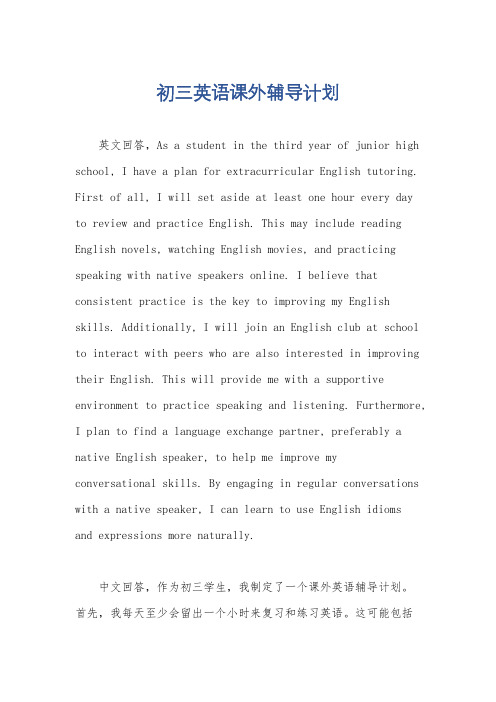
初三英语课外辅导计划英文回答,As a student in the third year of junior high school, I have a plan for extracurricular English tutoring. First of all, I will set aside at least one hour every dayto review and practice English. This may include reading English novels, watching English movies, and practicing speaking with native speakers online. I believe that consistent practice is the key to improving my English skills. Additionally, I will join an English club at school to interact with peers who are also interested in improving their English. This will provide me with a supportive environment to practice speaking and listening. Furthermore, I plan to find a language exchange partner, preferably a native English speaker, to help me improve myconversational skills. By engaging in regular conversations with a native speaker, I can learn to use English idiomsand expressions more naturally.中文回答,作为初三学生,我制定了一个课外英语辅导计划。
中考英语周计划
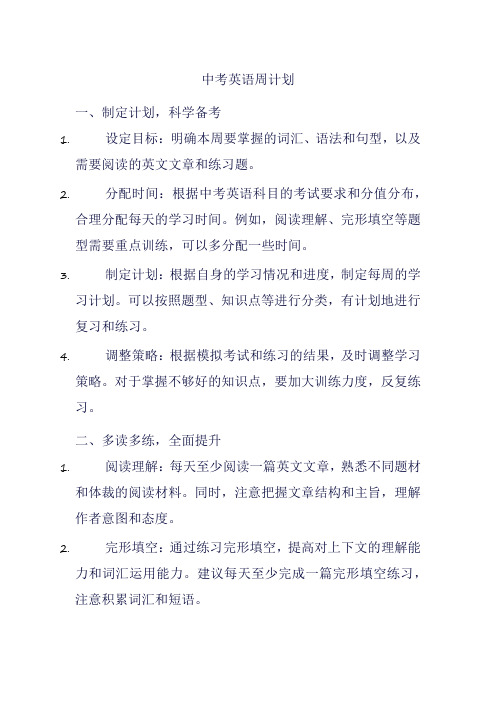
中考英语周计划一、制定计划,科学备考1.设定目标:明确本周要掌握的词汇、语法和句型,以及需要阅读的英文文章和练习题。
2.分配时间:根据中考英语科目的考试要求和分值分布,合理分配每天的学习时间。
例如,阅读理解、完形填空等题型需要重点训练,可以多分配一些时间。
3.制定计划:根据自身的学习情况和进度,制定每周的学习计划。
可以按照题型、知识点等进行分类,有计划地进行复习和练习。
4.调整策略:根据模拟考试和练习的结果,及时调整学习策略。
对于掌握不够好的知识点,要加大训练力度,反复练习。
二、多读多练,全面提升1.阅读理解:每天至少阅读一篇英文文章,熟悉不同题材和体裁的阅读材料。
同时,注意把握文章结构和主旨,理解作者意图和态度。
2.完形填空:通过练习完形填空,提高对上下文的理解能力和词汇运用能力。
建议每天至少完成一篇完形填空练习,注意积累词汇和短语。
3.听力训练:通过听英语材料,提高听力理解和反应速度。
可以选择英语新闻、英语歌曲、英语电影等材料进行训练。
4.写作练习:每周至少完成一篇英文写作练习,熟悉各种文体和写作风格。
注意语法、词汇和句型的准确性,以及文章的结构和逻辑性。
5.口语练习:每天至少进行10分钟的口语练习,与同学或老师进行英语对话。
可以结合课本中的口语练习题目,或者使用一些在线口语练习平台进行练习。
三、查漏补缺,巩固基础1.词汇复习:每周复习一遍中考要求的词汇和短语,可以采用词汇卡片、手机APP等方式进行复习。
同时,注意积累常见词汇和短语搭配。
2.语法复习:回顾和巩固初中阶段所学的语法知识,包括时态、语态、语气、非谓语动词等。
可以通过做题和讲解例句来加深理解。
3.错题回顾:每周回顾一次练习和模拟考试中的错题,分析错误原因并加以纠正。
同时,要注重总结解题技巧和方法。
4.拓展知识:根据个人兴趣和需要,可以阅读一些英语报刊、杂志或听力材料来拓展知识面和文化背景了解。
四、模拟考试,检验成果1.每周进行一次模拟考试,严格按照中考要求进行答题和评分。
九年级英语中考备考计划表详细
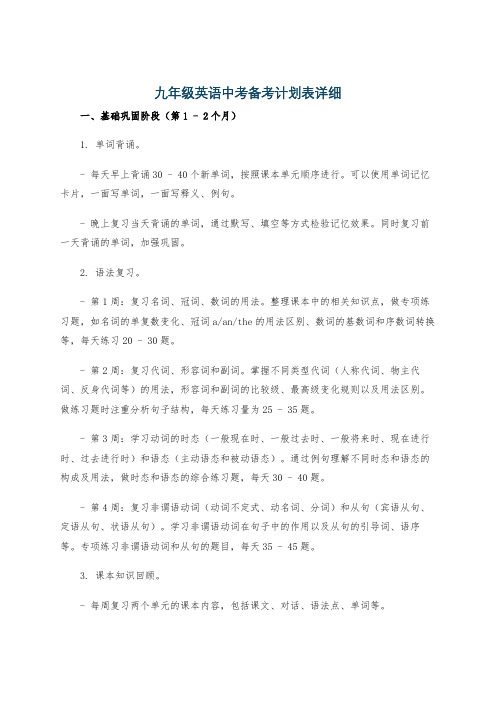
九年级英语中考备考计划表详细一、基础巩固阶段(第1 - 2个月)1. 单词背诵。
- 每天早上背诵30 - 40个新单词,按照课本单元顺序进行。
可以使用单词记忆卡片,一面写单词,一面写释义、例句。
- 晚上复习当天背诵的单词,通过默写、填空等方式检验记忆效果。
同时复习前一天背诵的单词,加强巩固。
2. 语法复习。
- 第1周:复习名词、冠词、数词的用法。
整理课本中的相关知识点,做专项练习题,如名词的单复数变化、冠词a/an/the的用法区别、数词的基数词和序数词转换等,每天练习20 - 30题。
- 第2周:复习代词、形容词和副词。
掌握不同类型代词(人称代词、物主代词、反身代词等)的用法,形容词和副词的比较级、最高级变化规则以及用法区别。
做练习题时注重分析句子结构,每天练习量为25 - 35题。
- 第3周:学习动词的时态(一般现在时、一般过去时、一般将来时、现在进行时、过去进行时)和语态(主动语态和被动语态)。
通过例句理解不同时态和语态的构成及用法,做时态和语态的综合练习题,每天30 - 40题。
- 第4周:复习非谓语动词(动词不定式、动名词、分词)和从句(宾语从句、定语从句、状语从句)。
学习非谓语动词在句子中的作用以及从句的引导词、语序等。
专项练习非谓语动词和从句的题目,每天35 - 45题。
3. 课本知识回顾。
- 每周复习两个单元的课本内容,包括课文、对话、语法点、单词等。
- 大声朗读课文,培养语感,同时加深对单词和语法的理解。
二、专项提升阶段(第3 - 4个月)1. 听力专项训练。
- 每天听一套中考听力模拟题。
听前先快速浏览题目,预测听力内容。
- 听的过程中注意关键词、数字、时间等重要信息,可适当做笔记。
- 听完后对照答案,分析错题原因,如没听清单词、对听力内容理解错误等,针对问题进行改进。
2. 阅读理解专项训练。
- 每天做两篇阅读理解练习。
阅读文章时要掌握略读、扫读等技巧,提高阅读速度。
- 做完题目后,认真分析错题,总结不同类型阅读题(细节理解题、主旨大意题、推理判断题等)的解题方法。
2024年初中班级学习计划英文版

2024年初中班级学习计划英文版2024 Middle School Class Learning PlanIn the year 2024, our middle school class will focus on a well-rounded learning plan to ensure the academic success and personal growth of all students. The plan will encompass various subjects and activities to cater to the diverse needs and interests of our students.Academic Subjects1. Mathematics: Emphasis will be placed on building a strong foundation in mathematical concepts and problem-solving skills.2. Language Arts: Students will engage in reading, writing, and critical thinking exercises to enhance their language skills.3. Science: Hands-on experiments and real-life applications will be integrated to make science more engaging and practical.4. Social Studies: Studying history, geography, and current events will help students develop a broader understanding of the world around them.Extracurricular Activities1. Sports: Encouraging students to participate in sports activities to promote physical fitness and teamwork.2. Arts: Providing opportunities for students to explore their creativity through music, art, and drama.3. Clubs: Offering a variety of clubs such as debate, coding, and environmental awareness to nurture students' interests and talents.Personal Growth1. Character Education: Teaching values such as honesty, responsibility, and empathy to help students become well-rounded individuals.2. Social Skills: Providing opportunities for students to interact with their peers and develop strong communication and interpersonal skills.3. Goal Setting: Encouraging students to set academic and personal goals to instill a sense of purpose and motivation.By implementing this comprehensive learning plan, we aim to create a supportive and enriching environment where every student canthrive academically and personally. We look forward to a successful year of growth and achievement in 2024!。
中考100天英语学习计划

中考100天英语学习计划Day 1-10: Setting the FoundationDuring the first 10 days, it's important to set a strong foundation for your English study. This means focusing on the basics such as grammar rules, vocabulary, and reading comprehension.- Learn and review the basic English grammar rules, including tenses, articles, prepositions, and sentence structure. Refer to a grammar book or online resources for explanations and examples.- Build up your English vocabulary by learning 10 new words each day. Keep a vocabulary journal and practice using the words in sentences to better understand their meanings and usage.- Read English texts, such as stories, articles, or news reports, to improve your reading comprehension skills. Pay attention to the main ideas, supporting details, and overall message of the texts.Day 11-20: Developing Listening and Speaking SkillsThe next 10 days will focus on improving your listening and speaking skills in English. This is crucial for communicating effectively and understanding spoken English.- Listen to English audio materials, such as podcasts, radio programs, or online videos. Try to understand the main ideas and details of the conversations or discussions.- Practice speaking English by engaging in conversations with friends, family members, or classmates. You can also record yourself speaking and listen to the recordings to identify areas for improvement.- Work on your pronunciation by practicing individual sounds and intonation patterns. Mimic native speakers and pay attention to how they articulate words and phrases.Day 21-30: Writing PracticeWriting is an essential skill for expressing your thoughts and ideas in English. During these 10 days, focus on improving your writing abilities.- Practice writing short paragraphs or essays on various topics, such as personal experiences, opinions on current issues, or descriptions of people and places. Pay attention to the organization of your writing, as well as the use of cohesive devices and transitions. - Review and revise your writing to correct grammatical errors, improve sentence structure, and refine your vocabulary choices. Consider seeking feedback from a teacher or tutor to further enhance your writing skills.- Expand your writing repertoire by exploring different types of texts, such as narratives, expositions, or persuasive essays. This will help you become more versatile in expressing yourself through writing.Day 31-40: Reviewing and ReinforcingAt the halfway point of your 100-day English study plan, take the time to review and reinforce the concepts and skills you've learned so far. This will help solidify your understanding and prepare you for more advanced topics.- Review the grammar rules and vocabulary you've learned, and create practice exercises to test your knowledge. Focus on areas where you need more practice and seek additional resources for reinforcement.- Retake reading comprehension and listening comprehension exercises from earlier in the study plan to assess your progress. Identify any areas of weakness and work on strengthening your skills in those areas.- Reflect on your speaking and writing practice and consider areas for improvement. Set specific goals for the next 30 days to further develop your language skills.Day 41-50: Advanced Grammar and VocabularyFor the next 10 days, delve into more advanced aspects of English grammar and vocabulary. This will help you expand your language proficiency and tackle more complex language tasks.- Study advanced grammar topics, such as conditional sentences, reported speech, passive voice, and complex sentence structures. Practice using these grammar patterns in context to fully grasp their nuances.- Expand your vocabulary by learning and using advanced words and phrases. Focus on synonyms, antonyms, idiomatic expressions, and collocations to enrich your language repertoire.- Read challenging English texts, such as literary works, academic articles, or advanced-level books, to encounter new vocabulary and complex grammar structures in context.Day 51-60: Improving Listening and Speaking ProficiencyDuring these 10 days, dedicate yourself to improving your listening and speaking proficiency even further. This will prepare you to understand and express yourself in a variety of real-life situations.- Listen to a range of English accents, including British, American, Australian, and others, to familiarize yourself with different pronunciations and speech patterns. This will help you understand English speakers from diverse backgrounds.- Engage in role-playing activities or discussions with classmates to practice speaking in different contexts. This could involve giving a presentation, participating in a debate, or simulating everyday conversations.- Work on your listening comprehension by completing exercises that focus on understanding idiomatic expressions, colloquial language, and other aspects of informal speech.Day 61-70: Writing Essays and CompositionsIn the next 10 days, dedicate yourself to writing essays and compositions on a variety of topics. This will help you hone your ability to construct coherent and well-structured pieces of writing.- Practice writing different types of essays, such as descriptive, narrative, expository, and persuasive essays. Pay attention to the purpose and audience of each essay type, and adjust your writing style accordingly.- Learn to respond to essay prompts effectively by brainstorming ideas, outlining your essay, and organizing your thoughts logically. Practice writing under timed conditions to simulate exam situations.- Revise and edit your essays to improve clarity, coherence, and cohesion. Focus on using a range of sentence structures, transitional devices, and rhetorical strategies to enhance the impact of your writing.Day 71-80: Reading Strategies and AnalysisIn the next 10 days, focus on refining your reading strategies and analytical skills. This will help you approach reading comprehension exercises with confidence and precision.- Practice skimming and scanning texts to quickly identify main ideas, key details, and supporting evidence. These strategies will help you manage your time effectively during reading assessments.- Develop critical reading skills by analyzing and interpreting texts. Pay attention to the author's purpose, tone, and perspective, as well as the underlying themes and messages conveyed in the text.- Work on summarizing and synthesizing information from multiple sources, such as articles, reports, and opinion pieces. This will help you consolidate and convey the main points of the texts effectively.Day 81-90: Review and PracticeAs you approach the final stretch of your 100-day English study plan, take the time to review and practice extensively. This will help you consolidate your learning and ensure that you're well-prepared for the upcoming exam.- Review all the grammar rules, vocabulary, and language skills you've learned throughout the study plan. Create comprehensive review exercises and practice tests to assess your knowledge and pinpoint areas for improvement.- Complete a variety of reading comprehension, listening comprehension, and writing exercises to simulate exam conditions. Pay attention to time management and accuracy as you work through the exercises.- Seek feedback from a teacher, tutor, or study partner on your language skills and address any lingering doubts or concerns you may have. Use their input to refine your abilities further.Day 91-100: Test-Taking Strategies and Final ReviewDuring the final 10 days, focus on test-taking strategies and a final review of all the essential concepts and skills you've learned. This will help you approach the exam with confidence and poise.- Familiarize yourself with the format and expectations of the upcoming exam, including the types of questions, time limits, and scoring criteria. Develop a test-taking strategy that plays to your strengths and minimizes your weaknesses.- Complete full-length practice tests under timed conditions to simulate the exam experience. This will help you gauge your readiness and identify any areas that require further attention before the exam.- Review the most challenging aspects of the English language, such as complex grammar structures, advanced vocabulary, and critical reading techniques. This will help you enter the exam feeling well-prepared and confident.In conclusion, a 100-day English study plan is a comprehensive and strategic approach to preparing for the middle school entrance exam. By systematically focusing on different language skills and concepts, and by incorporating regular practice and review, you can significantly enhance your English proficiency and performance on the exam. With dedication, perseverance, and a clear focus on your goals, you can make the most of this study plan and achieve success in your English language learning journey.。
中考英语作文 每日课程安排
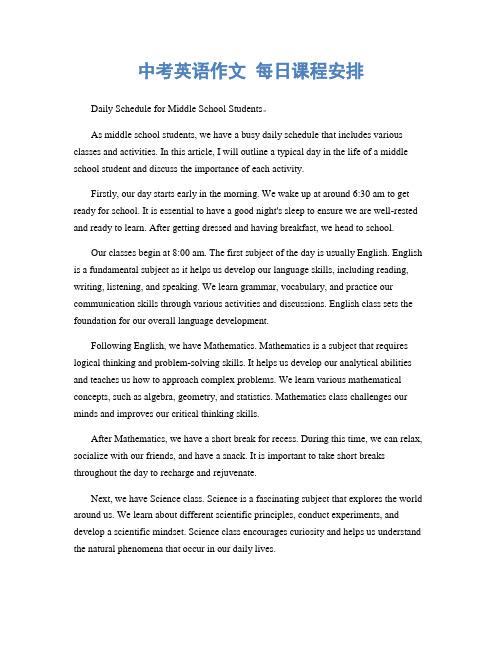
中考英语作文每日课程安排Daily Schedule for Middle School Students。
As middle school students, we have a busy daily schedule that includes various classes and activities. In this article, I will outline a typical day in the life of a middle school student and discuss the importance of each activity.Firstly, our day starts early in the morning. We wake up at around 6:30 am to get ready for school. It is essential to have a good night's sleep to ensure we are well-rested and ready to learn. After getting dressed and having breakfast, we head to school.Our classes begin at 8:00 am. The first subject of the day is usually English. English is a fundamental subject as it helps us develop our language skills, including reading, writing, listening, and speaking. We learn grammar, vocabulary, and practice our communication skills through various activities and discussions. English class sets the foundation for our overall language development.Following English, we have Mathematics. Mathematics is a subject that requires logical thinking and problem-solving skills. It helps us develop our analytical abilities and teaches us how to approach complex problems. We learn various mathematical concepts, such as algebra, geometry, and statistics. Mathematics class challenges our minds and improves our critical thinking skills.After Mathematics, we have a short break for recess. During this time, we can relax, socialize with our friends, and have a snack. It is important to take short breaks throughout the day to recharge and rejuvenate.Next, we have Science class. Science is a fascinating subject that explores the world around us. We learn about different scientific principles, conduct experiments, and develop a scientific mindset. Science class encourages curiosity and helps us understand the natural phenomena that occur in our daily lives.After Science, we have Physical Education (PE). PE is a crucial part of our daily schedule as it promotes physical fitness and overall well-being. We participate in various sports activities, such as basketball, soccer, and running. PE class not only keeps us physically active but also teaches us teamwork, discipline, and sportsmanship.Following PE, we have lunch break. It is important to have a nutritious meal to fuel our bodies and provide energy for the rest of the day. During lunch break, we can socialize with our classmates, relax, and recharge for the afternoon classes.After lunch, we have Social Studies. Social Studies is a subject that helps us understand the world's history, geography, and culture. We learn about different civilizations, historical events, and their impact on society. Social Studies class broadens our knowledge and encourages us to become global citizens.Lastly, we have elective classes in the afternoon. Elective classes include subjects like Art, Music, and Technology. These classes allow us to explore our creative side and develop skills in various fields. Elective classes provide a break from the academic subjects and allow us to express ourselves through different mediums.After the elective classes, our regular school day comes to an end. However, many of us participate in extracurricular activities such as sports teams, clubs, or music lessons. These activities provide additional opportunities for personal growth and skill development.In conclusion, the daily schedule of a middle school student is packed with a variety of classes and activities. Each subject and activity plays a crucial role in our overall development. From English and Mathematics to Science and Social Studies, we learn valuable skills and knowledge that prepare us for the future. Additionally, physical education and elective classes allow us to explore our interests and develop well-rounded personalities. It is important for us to make the most of our daily schedule and strive for excellence in all areas of our education.。
初中英语十天学习计划

初中英语十天学习计划Welcome to the first day of your ten-day English study plan! Today, we will focus on getting started with some basic English grammar and vocabulary. Let's begin by reviewing some common English greetings and introductions.- Good morning!- Hi, my name is [your name].- How are you?- Nice to meet you.Now, let's move on to some basic grammar.- Review the basic sentence structure: subject + verb + object.- Practice using the verb "to be" in present tense (am, is, are).- Learn some common English articles ("a", "an", "the").Day 2:On the second day of your English study plan, let's continue with more grammar and vocabulary practice.- Review and practice using common English prepositions (in, on, under, over, etc.)- Learn how to use the present continuous tense (I am running, she is eating, they are studying).- Practice using adjectives to describe people, places, and things.Day 3:Today, we will focus on expanding your English vocabulary.- Learn and practice using common English verbs (eat, drink, run, play, work, etc.)- Practice using common English nouns (house, car, book, table, etc.)- Expand your vocabulary by learning some new words related to everyday activities, hobbies, and interests.Day 4:Let's continue working on building your English vocabulary and grammar skills.- Learn and practice using common English adverbs (slowly, quickly, carefully, etc.)- Review and practice using the simple past tense (I ate, she ran, they played).- Expand your vocabulary by learning some new words related to food, clothes, and the environment.Day 5:Today, we will focus on improving your English listening and speaking skills.- Listen to some recorded English conversations and practice repeating the sentences out loud.- Practice introducing yourself and having simple conversations with a partner or friend.- Watch some short English videos or listen to English songs to practice your listening skills. Day 6:Let's focus on reading and writing in English today.- Read some short English stories or articles and practice summarizing the main ideas in your own words.- Practice writing short paragraphs about your daily activities, hobbies, or interests in English.- Review some common English punctuation and capitalization rules.Day 7:Today, we will continue working on improving your English reading and writing skills.- Read some longer English texts, such as news articles or short stories, and practice identifying the main ideas and supporting details.- Practice writing longer paragraphs or simple essays in English about a topic of interest to you.- Review and practice using common English conjunctions (and, but, or, because, etc.)Day 8:On the eighth day of your English study plan, let's focus on reviewing and practicing all the grammar and vocabulary you have learned so far.- Take some quizzes or tests to review and assess your understanding of basic English grammar and vocabulary.- Practice using the new vocabulary and grammar structures in different contexts, such as in conversations, writing, and reading.Day 9:Today, we will focus on learning some common English idioms and expressions.- Learn and practice using common English idioms and expressions in context.- Practice having conversations and using the new idioms and expressions you have learned. - Watch some English movies or TV shows to hear the idioms and expressions being used in a natural context.Day 10:On the final day of your English study plan, let's focus on reviewing and practicing everything you have learned.- Take some time to review and practice using all the grammar, vocabulary, idioms, and expressions you have learned.- Have conversations with native English speakers or practice speaking in English with a language partner.- Reflect on your progress and set some goals for continuing to improve your English skills. Congratulations on completing your ten-day English study plan! Keep practicing and using your English skills regularly to continue improving. Great job!。
中考前一星期英语学习计划

中考前一星期英语学习计划
第一天:复习基础语法知识和常用词汇
上午:复习名词、动词、形容词等基础语法知识,特别是一般现在时和一般过去时的用法。
下午:整理常用词汇,重点复习考试可能涉及的常用词汇和短语,多做词汇练习。
第二天:听力和阅读训练
上午:听力训练,多听一些英语录音,尝试听懂其中的内容并做笔记。
下午:阅读训练,多读一些英语文章,注意文章的逻辑结构和词汇搭配。
第三天:写作练习
上午:复习写作常用句型,写作中常用的连接词、过渡词等。
下午:结合考试要求,写一篇题材适合的作文,重点训练文章的结构和语法表达。
第四天:口语练习
上午:找一个英语学习伙伴,进行口语练习,尝试用英语进行日常对话练习。
下午:通过英语对话或者影视剧学习口语表达,注意语音语调,尝试模仿并练习。
第五天:巩固知识
上午:进行一些中考模拟题练习,发现自己的薄弱点。
下午:针对中考模拟题中的错误,及时进行错误的纠正,总结出错的原因。
第六天:复习总结
上午:对本周学习的知识进行总结,做一个复习计划,计划好复习每一部分的内容。
下午:在家中的角落,或在辅导老师的帮助下,复习每一部分的内容并进行有针对性的练习。
第七天:放松心情
上午:进行一些放松的活动,如散步、听音乐、看书等。
下午:复习一遍所有的知识点,加强记忆,尽量保持心情愉快和放松。
以上是一周的中考前英语学习计划,通过这样的学习计划,希望能对中考英语的备考有所
帮助。
祝愿学生们以饱满的精神状态迎接中考,实现自己的梦想。
中考英语100天学习计划

中考英语100天学习计划In the first ten days of your 100-day English learning plan, focus on building your vocabulary and refreshing your knowledge of basic grammar.Day 1-2: Review basic grammar rules, such as verb tenses, articles, and prepositions. Practice forming simple sentences and questions.Day 3-5: Learn and practice common everyday vocabulary related to greetings, introductions, and asking for information. Use flashcards or online resources to reinforce your learning.Day 6-8: Expand your vocabulary to include numbers, time, and basic activities. Practice speaking and writing sentences using these new words.Day 9-10: Test your knowledge with quizzes or exercises to ensure your understanding of the basic vocabulary and grammar concepts.Day 11-20: Listening and Speaking SkillsFocus on improving your listening and speaking skills during the second phase of your learning plan.Day 11-13: Practice listening to simple English conversations and stories. Try to identify key words and phrases, and write them down to reinforce your understanding.Day 14-16: Speak out loud in English for at least 10 minutes each day. This could be by reading out loud, practicing a short presentation, or having a simple conversation with a friend or family member.Day 17-19: Watch English videos or listen to English songs to train your ears to the sounds and rhythm of the language. Pay attention to pronunciation and intonation.Day 20: Record yourself speaking in English and listen back to identify areas for improvement.Day 21-30: Reading and Writing PracticeDuring this phase of your learning plan, focus on improving your reading and writing skills. Day 21-23: Read short texts or articles in English. Try to understand the main ideas and important details. Look up any unfamiliar words.Day 24-26: Practice writing simple sentences and short paragraphs. Pay attention to grammar and spelling.Day 27-29: Expand your reading to include longer and more complex texts, such as news articles or short stories. Try to summarize the main points in writing.Day 30: Write a short essay or diary entry in English to summarize your learning progress so far.Day 31-40: Vocabulary BuildingDedicate this phase of your learning plan to expanding your vocabulary in specific areas. Day 31-33: Learn and practice vocabulary related to food, drinks, and cooking. Try to describe your favorite foods and recipes in English.Day 34-36: Focus on vocabulary related to everyday activities, such as shopping, household chores, and hobbies.Day 37-39: Learn vocabulary related to travel and transportation, including modes of transport, directions, and places of interest.Day 40: Test your knowledge with vocabulary quizzes or games to reinforce your learning. Day 41-50: Grammar Review and ApplicationTake time to review and apply more advanced grammar concepts during this phase of your learning plan.Day 41-43: Review and practice using different types of clauses and sentence structures, such as relative clauses, conditionals, and reported speech.Day 44-46: Focus on improving your understanding and use of phrasal verbs and idiomatic expressions in context.Day 47-49: Learn and practice using different types of phrases, such as prepositional phrases, noun phrases, and adverbial phrases.Day 50: Test your understanding of advanced grammar concepts with exercises or quizzes. Day 51-60: Speaking and Writing FluencyWork on becoming more fluent and confident in your speaking and writing during this phase of your learning plan.Day 51-53: Practice speaking in longer sentences and expressing more complex ideas in English. Focus on fluency and natural-sounding speech.Day 54-56: Write longer paragraphs or short essays on different topics to improve your writing fluency. Pay attention to organization and coherence.Day 57-59: Practice speaking and writing in English for at least 15 minutes each day. Record yourself to track your progress.Day 60: Have a conversation in English with a friend or language partner, and ask for feedback on your fluency and communication skills.Day 61-70: Reading Comprehension and Vocabulary ExpansionContinue to improve your reading comprehension skills and expand your vocabulary during this phase of your learning plan.Day 61-63: Read longer, more complex texts in English and practice summarizing the main points and important details.Day 64-66: Learn and practice vocabulary related to academic and specialized fields, such as science, technology, and business.Day 67-69: Practice reading and understanding different types of texts, such as editorials, opinion pieces, and academic articles. Pay attention to the author's tone and point of view.Day 70: Test your reading comprehension skills with longer and more challenging texts, and identify areas for improvement.Day 71-80: Listening Comprehension and Speaking ProficiencyRefine your listening comprehension skills and work on speaking more fluently and accurately during this phase of your learning plan.Day 71-73: Practice listening to English audio materials at a natural speed, such as podcasts or radio broadcasts. Take notes and summarize the main points.Day 74-76: Work on pronouncing difficult sounds and words in English, and practice speaking tongue twisters or challenging phrases to improve your pronunciation.Day 77-79: Have conversations with native English speakers or language partners to practice speaking in a natural and conversational manner.Day 80: Record yourself speaking in English and compare it to native speakers to identify areas for improvement.Day 81-90: Writing Proficiency and Vocabulary EnrichmentFocus on improving your writing skills and enriching your vocabulary during this phase of your learning plan.Day 81-83: Write longer essays or reports on different topics to practice organizing and developing your ideas in written form.Day 84-86: Expand your vocabulary to include more advanced and specialized words and phrases relevant to your interests or future study and career goals.Day 87-89: Practice using advanced vocabulary in context by writing sentences and short paragraphs that demonstrate a nuanced understanding of word meanings and usage.Day 90: Test your writing proficiency and vocabulary knowledge by writing a longer and more complex essay or report.Day 91-100: Review and PracticeUse the final phase of your learning plan to review and practice everything you've learned so far, and to prepare for any upcoming exams or assessments.Day 91-95: Review and practice using all the grammar concepts, vocabulary, and language skills you've learned so far through quizzes, exercises, and practice tests.Day 96-98: Identify any areas of weakness or difficulty and spend extra time reviewing and practicing those specific skills or topics.Day 99: Practice under exam conditions by taking a mock test or completing a practice exam to simulate the experience of a real exam.Day 100: Reflect on your learning journey, celebrate your progress, and set new goals for your continued English language learning. Consider seeking feedback from teachers, tutors, or language partners to help guide your future learning.By following this 100-day English learning plan, you can make significant progress in your language skills and feel more confident and prepared for any English language assessments or exams that lie ahead. Good luck, and happy learning!。
2024年初三英语学习计划(4篇)

2024年初三英语学习计划引言:学习英语是一个长期的过程,需要不断地积累和练习。
作为一名初三学生,2024年是我最后一年学习初中英语的机会。
在这一年里,我将制定一个详细的学习计划,以提高我的英语水平。
通过合理的安排和努力,我相信我能够在英语学习方面取得显著的进展。
一、学习目标在2024年初三期间,我的学习目标是:1. 提高英语听说能力,能够流利地进行简单的对话;2. 扩大词汇量,掌握常用单词和短语;3. 提高阅读理解能力,能够读懂初级英语文章;4. 提高写作能力,能够写简单的英语作文;5. 准备并顺利通过中考英语。
二、学习方法1. 多听多说:通过听英语歌曲、英语电影、英语广播等方式,提高自己的听力和口语表达能力。
尝试模仿和跟读,培养自己的语感;2. 多读多写:每周至少读一本英语小说,涉及不同主题和难度的文章。
同时,每周写一篇英语作文,练习用英语表达自己的想法;3. 合理安排学习时间:每天在规定的时间段内专注学习英语,避免分散注意力;4. 利用网络资源:使用各种英语学习网站和应用程序,如Duolingo、BBC Learning English等,进行在线练习和学习。
三、详细计划1. 语法学习a. 复习掌握初中英语的基本语法知识,包括时态、语态、被动语态等;b. 学习并掌握一些高级语法知识,如条件句、宾语从句、名词性从句等;c. 每周至少做一套语法练习题,检验自己的掌握情况。
2. 词汇积累a. 构建一个学习词汇的系统,包括分类、整理和记忆;b. 每日背诵10个新单词,并在例句或段落中使用这些单词;c. 阅读英文文章时遇到不认识的单词,记录并复习。
3. 听力练习a. 每周至少听两次英语歌曲,并跟读歌词,提高听力理解和口语表达能力;b. 每周至少听一篇英语短文或对话,找到其中的关键词,并写下大意。
4. 口语练习a. 参加学校英语角或英语俱乐部,和其他同学进行英语对话练习;b. 尝试模仿英语电影或电视剧中的对话,提高口语表达能力;c. 每周至少进行一次英语口语自我介绍,练习口语表达和自信心。
英语中考复习进度安排

第19课九年级Unit9-10
第20课九年级Unit11-12
第21课九年级Unit13-14
第一轮复习结束
5
9
4.27——5.1
第二轮复习开始:语法专项
第1课冠词与名词
第2课介词与数词
第3课代词与连词
第4课形容词与副词
4
劳动节放一天
10
5.4——5.8
第5课动词
第6课动词的时态
5
6
4.6——4.10
第11课八下Unit3-4
一模:4.8-4.9
4.10一模分析
2
清明放假一天
7
4.13——4.17
第12课八下Unit5-6
第13课八下Unit7-8
第14课八下Unit9-10
第15课九年级Unit1-2
第16课九年级Unit3-4
5
8
4.20——4.24
第17课九年级Unit5-6
第3课七下Unit1-5
第4课七下Unit6-9
第5课七下Unit10-12
5
1.每日听写
2.每周1-2次听力专项训练
3.配套作业本每日一课并讲解
4.每周一次作文练习
5
3.30——4.3
第6课八上Unit1-3
第7课八上Unit4-6
第8课八上Unit7-8
第9课八上Unit9-10
第10课八下Unit1-2
5
精选词汇、语法练习题
14
6.1——6.5
书面表达
中考全真模拟训练
5
精选各地中考模拟卷
15
6.8——6.12
中考全真模拟训练
解题技巧指导
中考英语教学计划通用

中考英语教学计划通用7篇2023中考英语教学计划(精选篇1)迎来了初三新学期,这下学期的教学工作格外重要,要充分的重视,吸取上学期的语文教学教学和经验,把这个学期的教学工作计划做好。
以下是本学期的语文教学工作计划:一、指导思想培养学生热爱祖国语文的思想感情,指导学生正确的理解和运用祖国语言,丰富语言的积累,培养语感,发展思维,使他们具有适应实际需要的识字写字能力,阅读能力,写作能力,口语交际能力,并重视提高学生的品德修养和审美情趣,使他们逐步形成良好的个性和健全的人格,促进德智体美德和谐发展。
二、教材分析九年级语文下册是按照新课程标准所编写的一套全新的语文教材,给学生和教师提供了丰富的语文资源,向师生展示了语文世界的广阔天地和无限风光。
全书共六个单元:1、诗的激情2、文学魅力3、关注自然和生命4、戏曲欣赏5、古文诗词6、古文诗词三、学生分析学生有一定的自主学习愿望和合作探究的欲求,部分学生对语文知识较感兴趣,但离新课程标准的要求还有很的差距,着眼于将来的学习动力还有待进一步的激发。
此外,学生的层次参差不齐,存在两极分化现象。
优秀生有一定的基础,上课愿意积极参与,但部分人比较懒散,没有很明确的学习目标,没有较好的学习态度,上课就当小和尚,对作业是抱着敷衍的态度。
口头能力和写作能力一般。
四、教学策略1、坚持上好教材上的阅读课,充分尊重学生,建立平等、和谐轻松、对话交流、互相协作的师生关系。
2、坚持在复习阶段充分发掘语文教材资源和身边的教学资源,注重突出语文的综合性和实践性,培养学生的综合实践能力和社会生活能力。
3、充分发挥学生的自主能动性,利用好小组的作用,把培养自主、探究、合作的学习方式作为教学的最终归宿。
4、充分发挥多媒体的优势,借助先进的教学手段实现教学信息的时空跨越和交互馈,促进教学效率的提高。
5、充分重视学生的情感、态度、价值观的取向,注重培养学生的人文精神和文化内涵,培养健全的人格和较高的素养。
- 1、下载文档前请自行甄别文档内容的完整性,平台不提供额外的编辑、内容补充、找答案等附加服务。
- 2、"仅部分预览"的文档,不可在线预览部分如存在完整性等问题,可反馈申请退款(可完整预览的文档不适用该条件!)。
- 3、如文档侵犯您的权益,请联系客服反馈,我们会尽快为您处理(人工客服工作时间:9:00-18:30)。
寒假集训班试卷册Day 1一.重点短语1.同意某人的意____________2.最后;终于________________3.在...末________________4.避免(做某事)_____________5.能够(有能力)做某事_______6.害怕_____________7.生某人的气______________8.有害于________________9.生来具有..._____________10.忙于做某事______________ 11.与...连接在一起___________12.被...覆盖________________13.与...不同________________14.在...方面不同_____________15.因为...身份而著名_________16.以...著名________________17.喜欢________________18.充满________________19.擅长于________________20.对...感兴趣______________二.重点句型句型1:There+be +主语+地点状语There_____ a boat _____ the river.河里有条船。
There _____ seven _______ in a week.一周有七天。
What's wrong with ______?= What’s the _______ with you?你怎么啦?What's wrong with _______ watch?你的手表有什么毛病?句型3:How do you like...?= What do you think of ...? How do you like China?(同义句转换) 你觉得中国怎么样?______ ______ ______ ______ ______ ______ ?句型4:had better(not)+动词原形You'd better _____ that policeman _____ ______.你最好去问问那边的那个警察。
You'd better _____ go shopping.It’s cold outside.你最好不要出去。
句型5:It's time to do sth. = It's time for sth.It’s time ____ have dinner = It’s time _____ ______该吃晚饭的时候。
It’s time ____ go to bed. 该是睡觉的时候了。
三.高频单词(动词)1.接受_________2.实现_________3.建议_________4.支付得起_________5.回答_________6.出现_________7.添加_________ 8.行动_________ 9.允许_________10.同意_________ 11.到达_________ 12.问_________13.欣赏_________ 14.争论_________ 15. 避免_________四.语法专项复习一名词主要考点:1. 名词分类及各自的修饰词;2.名词变复数(规则变化和不规则变化);3.名词所有格;4.名词作定语;5.名词词义辨析。
Day 2一.重点短语21.迟到______________22.由...制成______________23.由...组成______________24.对...满意______________ 25.为...而感到自豪___________26.对...负责任______________27.对某人严格______________28.对...感到惊奇____________29.对某人很感激_____________30.对...做准备______________31.习惯于______________ 32.由于______________33.属于______________34.两者都______________35.乘公共汽车______________36.顺便说;顺便问____________37.照顾______________38.着凉;感冒______________ 39.着火______________40.把A变成B________二.重点句型。
句型6:How+adj./adv.+主语+谓语!What a/an+adj.+n.+主语+谓语!______cold it is today !今天多冷啊!_______ fine weather it is!天气真好!句型7:Thank+sb.+for(doing)sth.Thank you for ________ to see me.感谢你来看我。
Thank you for _______ _________.感谢你的帮助。
He is a student.So ____ I.他是一个学生,我也是。
She likes popular music. So _____ my brother.他喜欢流行音乐,我弟弟也是Tom hasn’t finished his homework. ______ ______ Mary. Tom没完成作业,Mary也是。
They will not go skating. _____ ______ I.他们不去滑冰了,我也不去了。
句型9:...not...until...He ______ have supper ______ his parents came back.直到他的父母回来他才吃饭。
The doctor didn’t go to bed ______ 12 o’clock.那个医生直到12点才上床睡觉。
句型10:比较级+and+比较级Their life is becoming ______ and _______.他们的生活变得越来越好。
I hope you will become ________ and ______ _________.我希望你变得越来越漂亮。
The song is ______ and _______ __________. 这首歌曲越来越流行。
三.高频单词1.建议__________2.活动__________3.地址____________4.年龄________5.空气________6.注意________________7.事故_____________8.能够的_______9.可怕的______________ 10.活跃的___________ 11.害怕的_____ 12.活着的_________ 13.令人惊异的__________ 14.生气的__________ 15.焦虑的__________ 四.语法专项复习二----代词和冠词主要考点:1. 人称代词,物主代词和反身代词;2.不定代词,指示代词,疑问代词;3.冠词(定冠词the 和不定冠词a/an)Day 3一.重点短语。
41.改变主意______________42.办理登记______________43.来自于______________44.快点;加油;______________ 45.结束______________46.实现______________47.与...交流______________48.抱怨______________49.由...组成______________50.砍倒______________51.切断(电源)______________52.处理______________53.否认(做某事)______________54.因...病而死______________ 55.尽最大努力______________56.帮助某人______________57.逛街______________58.梦想(做某事)______________59.盛装打扮______________60.互相______________二.重点句型句型11:the +比较级,the +比较级The_______ you work,the more money you will make.工作越努力,赚的钱越多。
..not as(so)+adj./adv.+as...My sister is as ______ as I . 我妹妹和我一样高。
Lucy doesn’t study as ___________ as Lily.Lucy学习不如Lily认真。
句型13:more/less+adj.+than...I think English is ________ __________ than Japanese.我认为英语比日语有用。
I think art is ________ _________ than music.我认为艺术不如音乐重要。
句型14:stop/prevent/keep sb. from doing sth.We should stop people from _______ the __________.我们应该阻止人们污染环境。
句型15:both...and...Both you and I ______ students.我和你都是学生。
Both Lucy and Lily _____ country music. 都喜欢乡村音乐。
三.高频单词。
代词:1.任何人________ 2.任何事________ 3.任何地方________ 4. 某个人________ 5. 没有人________ 6. 一切事情________ 2.打败________ 8.开始________ 9.相信________11.借来________ 11.带来________ 12.打破________12.建筑________ 14.买________ 15.打扰________ 四.语法复习专项三----数词和介词主要考点:1. 基数词与序数词; 2. 分数和百分比;4.介词固定搭配。
Day 4一.重点短语61.鼓励某人做某事______________62.玩的开心______________63.入睡______________64.感觉困______________65.(离)遥远______________66.找出;查明;______________67.完成(做某事)______________68.例如______________69.免费______________70.第一次______________ 71.挨家挨户______________72.进展;与...相处______________73.挡道;阻碍______________74.养成...的习惯______________75.下车______________76.上车______________77.为...做准备______________78.摆脱,铲除______________79.对...感到厌倦______________80.到达______________二.重点句型句型16:either...or...Either you or he ______ wrong .不是你错就是他错。
